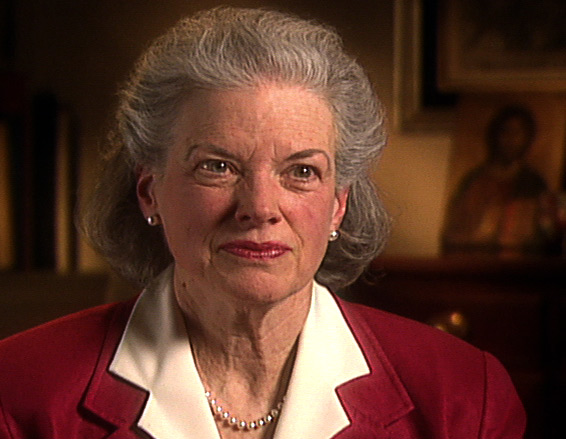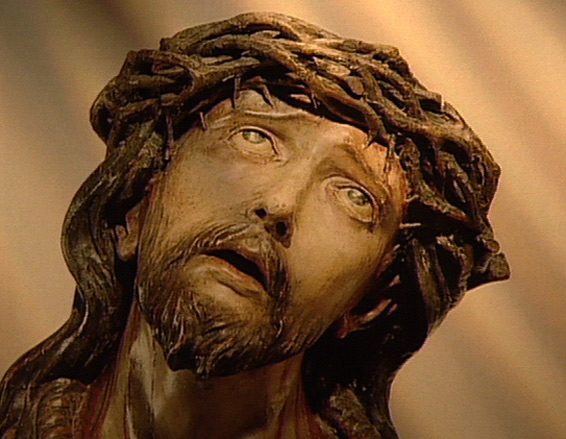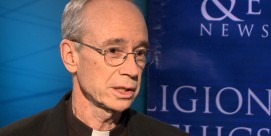In This Episode << SLIDE LEFT TO SEE ADDITIONAL SEGMENTS
Interview with Rev. Fleming Rutledge
The following interview with the Rev. Fleming Rutledge, preacher and author of THE UNDOING OF DEATH (Eerdmans), a collection of sermons for Holy Week and Easter, was conducted by RELIGION & ETHICS NEWSWEEKLY Editor, Missy Daniel.
Q: In your preaching, you make use of the texts of Christian hymns to great effect. How do hymns contribute to preaching during Holy Week and Easter and to understanding the meaning of these days?

A: I am struck by the fact that most people apparently do not pay any attention to the words of hymns. I’m always startled to realize that more often than not they haven’t noticed the words; it’s the tunes they like or that they are attracted to. In my Holy Week preaching, especially on Good Friday, I try to encourage people to pay attention to the words and to sing the hymns as though they were prayers.
There’s one hymn in particular that has profound theological depth. The name of it is “Ah, Holy Jesus,” and it shows how the believer identifies with the crowd that crucified Jesus: “‘Twas I, Lord Jesus, I it was denied thee, I crucified thee.” It’s an extraordinarily important worshipful act, especially at this time in our history, when there is so much discussion about the culpability of the Jews. Many people don’t understand that Christians (if Christians are really alert to what our tradition is) are taking this burden upon themselves, not pushing it off on the Jews.
Q: The hymns are real interpretations of the story of Holy Week.
A: Well, the best ones are, yes. Some of them are a little mawkish, but some of them are really good, and “Ah, Holy Jesus” is the best one.
Q: To what extent should the events of Holy Week and Easter 2,000 years ago and the New Testament stories about them seem strange to us, stay strange to our ears? You’ve written about how lost the language of sin and evil is to us, but you also preach about placing ourselves back within the story to understand it. Must the past and these events remain strange and distant to us?
A: That’s a very central question. As you were asking it, I was wondering to myself, do I really want to get myself back into that story, or do I want to bring the story forward to our time? I think it would be the latter. The tendency of people to be nostalgic or sentimental about faith and other issues as well is quite prevalent, and I like to try to emphasize the extraordinarily future-oriented nature of the Christian faith.
After September 11, I wrote a sermon about the fact that the cross discovered [at ground zero] really was the only symbol that could be raised there that was commensurate with the atrocity that was committed. That’s why I think we can still recover the language; we just have to reinterpret it. People are just as familiar today with atrocity and horror and tragedy and wickedness as they ever were. It’s just that it needs to be expressed somewhat differently because people are not accustomed to speaking about sin. But people know sin. They may not call it sin, but they know it. It’s the preacher’s task to show how this is a living reality.
Q: Is there anything different this year about the message and experience of Holy Week and Easter against the backdrop of world events?
A: Oh, sure. I’ve been preaching now for 27 years, and every year I’m struck by the fact that there is some new thing to speak of. Of course, last year and this year it was more dramatic and more geopolitical. But every year it’s something.
I have been preaching steadily now for several weeks about a Christian response to the war. One of my principal themes has dealt with the problem of evil. There’s been a great deal of criticism — rightly so, I think — of the president for dividing the world so neatly into good and evil. When the Christian faith is properly understood, we don’t divide the world into good and evil. We understand, as people like Aleksandr Solzhenitsyn did, that the line between good and evil runs through each person (he specifically wrote that in THE GULAG ARCHIPELAGO) and that there is a deep current of capacity for wickedness in all of us, given certain circumstances.
Many soldiers and veterans have spoken to me in recent weeks about discovering rage within themselves in combat that they didn’t know was there, and it scared them. Sometimes parents discover rage within themselves when their children won’t behave, and it scares them. We all have a propensity for destructive anger which we try to deny and repress, but it’s there. And when people do not recognize that tendency within themselves and project it off onto other people, that’s when we get into very serious trouble, and that’s what’s worrying critics of Bush’s Christian language.
Critics of Bush’s religious rhetoric are very concerned about his tendency to cast America in the role of the good, the innocent, and the virtuous and to describe other regimes as completely, irredeemably evil. A Christian doesn’t do that. Our greatest presidents, Washington and Lincoln, were shaped by the preaching of the church, and they called the nation to repentance. No president today would do that, and that’s a big loss, because Americans need to be conscious right now of the suffering of Iraqi civilians. Instead of that we’re completely focused on the incredible capacity and power of our military, and that’s not Christian — to focus on that to the exclusion of the people suffering under the bombardment.

In some ways we can rejoice that the dictatorship has been destroyed. I’m not necessarily anti-the war in a strict sense, but I’m very much concerned about the way that we are so self-righteous about it and so neglectful of other cultures. The crucifixion speaks directly to that because Jesus in the crucifixion is taking upon himself all those traits and qualities of evil and wickedness that we ascribe to “the other.” He has become “the other” on his cross, and that’s why it’s the most relevant thing in the world.
Q: Many people are drawn to the Easter story wanting to believe, trying to believe. In one of your sermons, you say that the Presbyterian pastor, David H.C. Read, once told his congregation: “One of the reasons I believe in the resurrection is that my mother told me. And to this day a strong element in my belief is the number and quality of the people who told me.” It’s such a simple reply. What did he mean?
A: People are always quoting that back to me. It seems to be a very memorable line. I wish I could think of a line of my own that people were quoting as much as that line of David Read’s. I’m a little worried about it, actually, because I meant it to be just one of many, many things that I was saying. I didn’t realize people were going to focus on that to the exclusion of virtually everything else.
It could sound a little bit sentimental. It could sound a little bit naïve. It could sound a little anti-intellectual or antirational — to believe something just because your mother told you. Some people’s mothers have told them to be on crazy diets or to take useless medications. Mothers tell children a lot of things that are not true. I wouldn’t want to put too much emphasis on that. The point that David Read and I both are making is that, in the case of the crucifixion and resurrection, witnesses can be trusted. That’s the important thing. When I have doubts about the resurrection, which I do pretty much every day, I always go back to Paul’s chapter in Corinthians (1 Corinthians 15), and invariably it restores my confidence that something really happened. I know Paul pretty well by now, after 50 years of studying him, and I believe Paul’s telling the truth. Ultimately that’s what Christian faith rests on — that the witnesses are telling the truth. All this modern discussion about the historical Jesus doesn’t touch that. I was just reading an article in THE NEW YORK REVIEW OF BOOKS by E. P. Sanders, which is highly critical of the latest book that has come out of the Jesus Seminar. He makes a wonderful point at the end of his essay. He says that what the Jesus Seminar scholars have overlooked is that Jesus is talking about God, and the action of God and the power of God and the intervention of God to bring about his kingdom. All this talk about what sort of genre Jesus preached and what type he was, how he fit into his time — it’s all interesting, and some of it’s important, but to overlook the fact that Jesus was about God is a fairly large oversight.
Q: Your sermons place great emphasis on a crucial moment in the story of the crucifixion — the cry of dereliction, when Jesus said on the cross, “My God, my God, why hast thou forsaken me?” Was it a moment of total abandonment by God? For Christians, how is the bad news, as you say, part of the good news?
A: There’s enormous debate about the cry of dereliction among theologians and biblical interpreters. I have chosen to follow one particular line of interpretation. Not everyone agrees with it, but I think it’s the right one. I think it’s the deepest one and the one most commensurate with our experience, because I think everyone feels godforsaken at times. And even if one does not feel personally godforsaken, any thoughtful person must admit that there have been millions of people over the years who have apparently been godforsaken — people who have died in cells alone, people who have been tortured to death, people who have been kidnapped or taken prisoner and have died away from their families and from everyone who loved them, who didn’t even know where they were or how they died.

We have to come to terms with what seems to be godforsakenness in the world. Many people find that difficult or even impossible. And people who find it difficult or impossible will probably not come to church on Good Friday and will concentrate on the happy aspect of the faith. But I think that’s too bad, because the real depth and strength of the faith is its facing of the worst, and the fact that Jesus faced and endured the worst is ultimately, for many, the only comfort we have in the extremities of the kind of situations that I’m talking about.
The only comfort we have is that Jesus was there before us and that somehow he wrested away the power of death and sin precisely in his abandonment. How that happened, I can’t say. But the entire proclamation of the church, of the New Testament witnesses, is that that is what happened. Precisely out of the abandonment, he descended into hell.
Q: Some people search for answers during Holy Week and Easter. You say that there are no answers to evil, and we are not given an answer. Is it wrong to want answers? What do people get if not answers?
A: It depends on what kinds of questions and answers we’re talking about. I wouldn’t exactly say we don’t get an answer. We do get an answer. We get the divine “yes” in the resurrection. I guess what I meant was that we don’t get specific answers about why does my God-fearing friend have painful cancer, or why does God seem to turn the other way when extremely useful Christian people are killed young, or why are so many Christians killed — I was struck by all the numbers of people at the World Trade Center who were active Christians, reading those little profiles in THE NEW YORK TIMES. We’re not going to get answers to those kinds of questions. But God has given us an answer in Christ, an answer to the question of what it means to be human, what human beings can hope for, what kind of life humans can live, what kinds of hopes and promises we can trust.
Q: You’re writing a new book on the meaning of the crucifixion of Jesus for today’s world.
A: It’s called CONDEMNED INTO REDEMPTION, from “Much Ado About Nothing.” [In Shakespeare’s play, the constable] Dogberry has finally managed to get somebody locked up, and he says, “Oh villain, thou art condemned into everlasting redemption.”
Q: Is that what we are?
A: It’s what Jesus was, first of all. It was Jesus who was condemned into redemption. The book is about Jesus, and the saying is about him. No, we are not condemned into redemption. He did it for us. We are not condemned the way he was. He’s the one who passed through condemnation for us so that we would not have to. “Condemned into redemption” is not about us; it’s about him. In the crucifixion we see the entire human race summed up in Jesus, who lived it for us. He suffered ultimate abandonment and condemnation and took it all into himself and brought it and us through into eternal life. “Recapitulation” is the word that the church father Irenaeus used for this. The term well conveys the sense that in Christ we see the entire history of humanity acted out and perfected, therefore recapitulated. But not only perfected — carried forward into the divine life of God. Again, there’s that future element.
Q: And what does it mean, then, for the human future, which often looks so grim?
A: Yes, it does, but then it always has. With the threat always present of the human species destroying itself, only a power from another sphere altogether can really mean anything. That’s what Christianity talks about — another sphere of power altogether. A power that called the entire creation into being in the first place is not going to be defeated by the tendency of that creation to destroy itself.
I have just finished a book [THE BATTLE FOR MIDDLE EARTH, forthcoming this summer] about THE LORD OF THE RINGS (the book, not the movie), and one of the reasons I’m so crazy about the book and wanted to write a book about the book is that Tolkien, throughout his thousand pages, is always holding in his mind this other sphere of power. It’s on every page, but you don’t know it unless you’re looking for it. A lot of people read the whole book and never see it.
It’s the concept of the other sphere of power that is lacking in a lot of Christian preaching.







